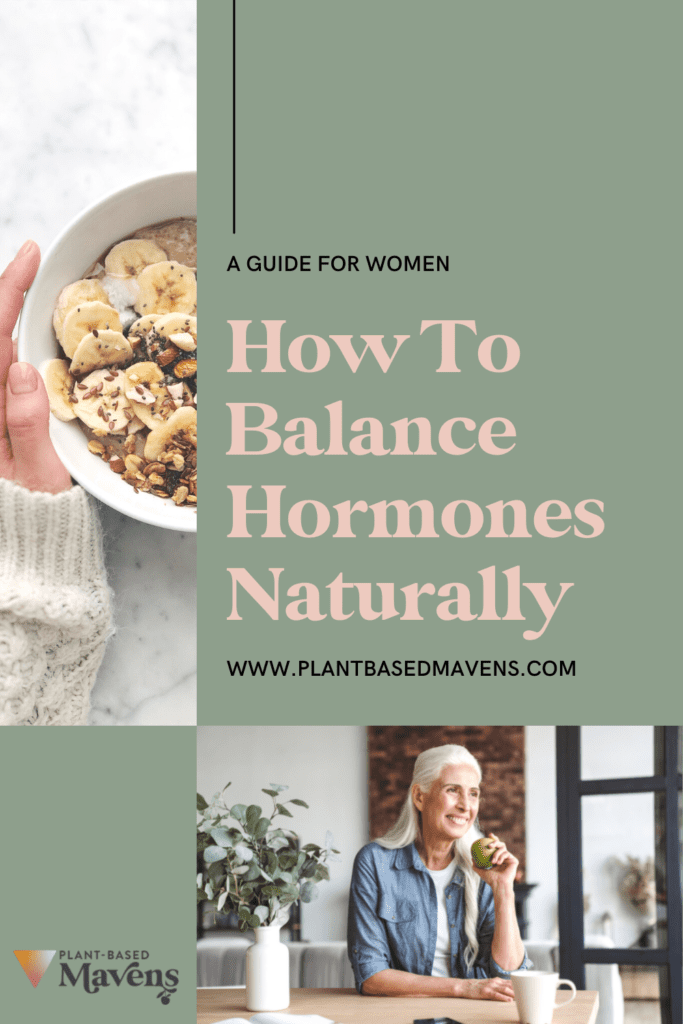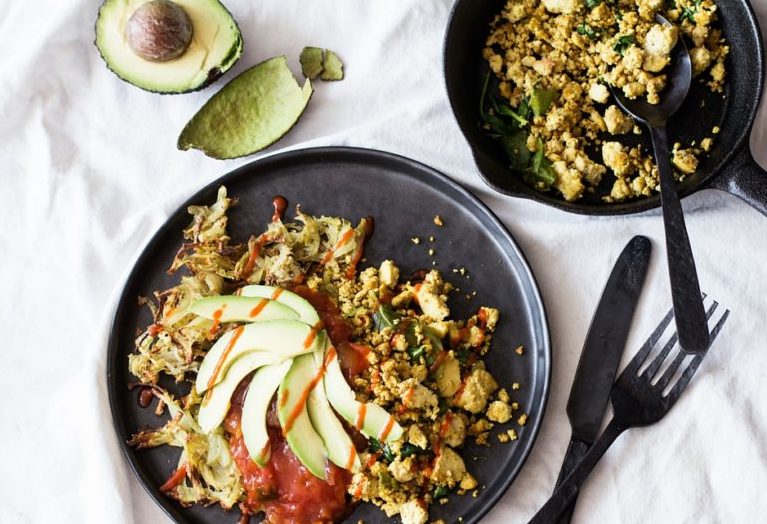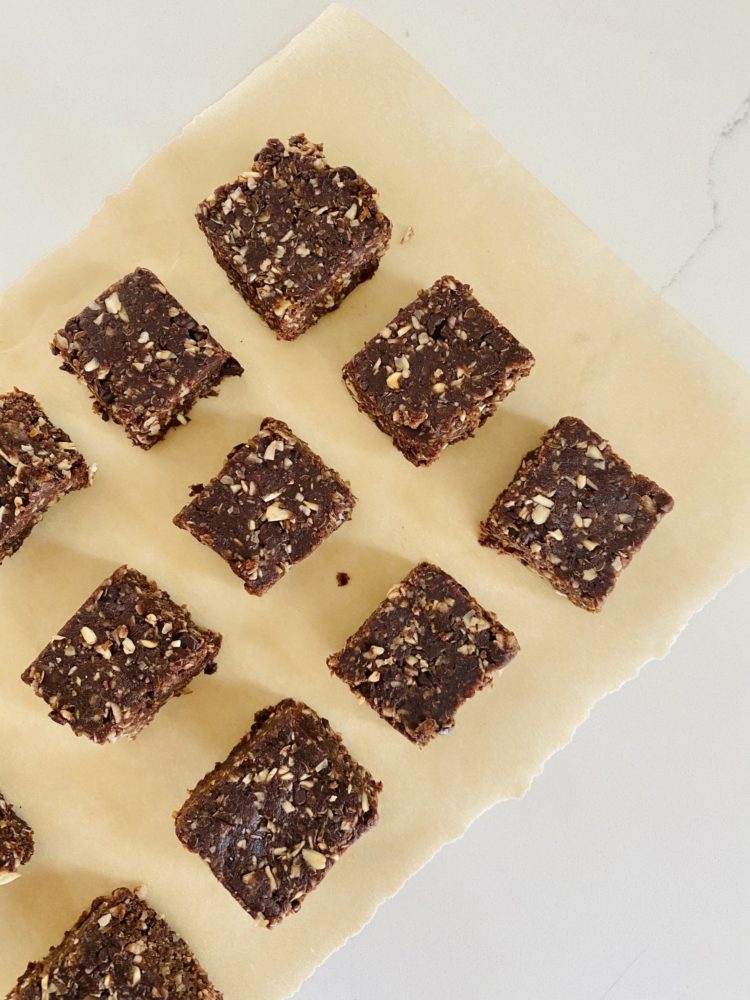Hormonal balance for women has become quite the buzzword, but for good reason! Whether you want natural remedies for irregular periods, you’ve been diagnosed with PCOS, you’re hoping for a smooth transition into menopause, or you’re trying to get back into balance after coming off of birth control pills, simple lifestyle and foods for hormonal balance and overall hormonal health can help you feel your best. Try these 9 ways to balance hormones naturally!

What are hormones?
First, what the heck are hormones? Hormones are essential chemical messengers in the body that play a crucial role in regulating various bodily functions. These signals are carried through the bloodstream to different organs, tissues, muscles, and skin, directing the body on what to do and when to do it. Hormones are responsible for coordinating processes such as metabolism, growth and development, reproduction, sexual function, and maintaining a constant internal balance known as homeostasis.
The human body produces over 50 different hormones, each with specific functions and roles to play in maintaining overall health and well-being. Some of the most common hormones include adrenaline, cortisol, insulin, estrogen, testosterone, and progesterone. These hormones are produced by glands in the endocrine system, such as the pituitary, thyroid, and adrenal glands, and are released into the bloodstream to reach their target organs.
Maintaining hormonal balance is crucial for optimal health since an imbalance can disrupt various bodily functions and lead to health issues. Factors such as diet, stress, lifestyle choices, and medical conditions like diabetes and thyroid disease can all impact hormone levels.
Maintaining a healthy lifestyle, including a balanced diet, regular exercise, stress management, and adequate sleep, can help support optimal hormone balance. Additionally, avoiding excessive sugar consumption, which can spike blood sugar levels and increase the risk of hormonal imbalances, is important for overall health.
Hormones are vital messengers in the body that regulate numerous bodily functions and play a significant role in overall health and well-being. Taking steps to support hormone balance through lifestyle can help optimize health and prevent potential health complications related to hormone imbalances.
What is a hormonal imbalance?
Hormonal imbalance is a term that is often used to describe the situation when there is too much or too little of a certain hormone in the body. However, it is important to note that “hormonal imbalance” is not a medical term. Instead, it is a broad and general term that people use to explain a variety of symptoms and conditions related to hormones.”Balanced hormones” or “hormone imbalance” can mean many different things. Even a slight fluctuation in hormone levels can have a significant impact on the body and may lead to certain conditions.
How do you know if your hormones are out of balance?
It’s estimated that 80% of women have a hormone imbalance! Imbalances can manifest as moodiness, fatigue, irregular menstrual cycles, and diagnoses like endometriosis or diabetes.
Signs of hormone imbalances
- Mood swings and irritability
- Hot flashes
- Fatigue and low energy levels
- Trouble sleeping
- Anxiety
- Unexplained weight gain
- Low sex drive
- Breast tenderness and pain
- Brain fog
- Brittle hair
- Dull and dry skin
- Irregular periods
- Excess body and facial hair
- Acne
- Vaginal dryness
- Gastrointestinal problems
- Night sweats
- Depression
To learn more about signs and symptoms of hormone imbalances as well as what causes them, read this post.
How long does it take to balance hormones?
Since hormonal health is so complex, the amount of time it takes to bring hormones back into balance is incredibly individual. I generally ask clients to give it at least three months of sticking with a hormone balancing protocol to see results. However, many shifts happen much sooner. For example, shifting to non-toxic products in your kitchen and bathroom can lower your environmental toxin body burden in just a week! Blood sugar can also normalize fairly quickly in just a couple weeks.

9 Ways To Balance Your Hormones Naturally
Eat more leafy greens
There are many wonderful foods for a hormone healthy diet, and dark leafy greens are at the top of that list. These veggie allies are packed with vitamins, minerals, phytochemicals, and fiber – all key to health hormone function and toxin elimination. Aim for at least one serving per day of kale, collards, swiss chard, Brussels sprouts, broccoli, cauliflower, or cabbage every day.
The best way to squeeze more greens into your day? Try my Blender Green Juice!
Get your healthy fats
Fats are key ingredients in hormone production, so going too low on fats in your diet contributes to hormone disruption. For example, in one study of women undergoing IVF treatment, those with the highest amount of monounsaturated fat in their diets were greater than three times more likely to conceive than women with the lowest intake. Get your daily dose of avocado, nuts, seeds, and omega-3 fatty acids from walnuts, flaxseed, and chia seeds.
For a tasty hormone-balancing dessert, try this creamy Chocolate Mousse made with avocados.
Enjoy beans and legumes
Not only do beans, lentils, and soy provide plant-based protein, they also contain phytoestrogens. Phytoestrogens are like plant hormones. They help clear excess hormones, block the detrimental effects of hormone-disrupting chemicals, and help keep hormone levels in balance overall. Beans and legumes are also great for balancing blood sugar. Eat at least one serving of beans, lentils, or soy (tofu, tempeh, edamame, soymilk) each day. Worried about soy? This post will clear up the controversy.
Some of my favorite ways to enjoy beans and soy: The Easiest Tofu Scramble, Chickpea Salad, and Three Bean Veggie Chili.
Load up on fiber
Fiber is a girl’s best friend when it comes to hormone balance because it helps clear excess hormones, especially excess estrogen levels. It also helps balance blood sugar levels. Because fiber is only found in plant foods, this is your sign to load up on plants – whole grains, beans, vegetables, and fruits. People who eat a predominantly plant-based diet are better at excreting excess hormones (thank you, fiber!) and tend to have lower rates of hormone-related health conditions.
Try one of these fiber-packed recipes: PB&J Protein Smoothie, Baked Oatmeal, and 3-ingredient Bean burgers.
Top off nutrients
It takes a lot of vitamins and minerals to fuel the intricate hormone system in your body. Nutrient deficiencies or low stores can make things go awry. Plus, things like birth control pills are actually known to deplete many nutrients in your body, so replenishment might be needed. All of the nourishing foods listed above will give you a nutrient boost, but getting everything you need from food isn’t always realistic. A daily multivitamin and vitamin D supplement may be helpful for topping off your needs. For more guidance on building a nutrient-rich diet, check out our Plant-Based Basics Course. It’s designed to make plant-based eating easy and sustainable. Another way to load up on nutrients? Make my most popular recipe: Vegan Bone Broth.
Reduce stress
Stress is more than just an emotional rollercoaster, it’s also a chemical rollercoaster that sets off a cascade of hormone-based responses, including elevated cortisol levels. Acute stress is a normal part of life, and our bodies are intelligently designed to handle short-term bouts of stress. The problem is that today most women live in a state of constant chronic stress levels, from balancing work and family to the burdensome societal pressures and expectations placed on women. This onslaught of stress-related hormones coursing through the body can wreak havoc on hormone balance.
While it’s impossible to eliminate all stressors, it’ll do your hormones good to find ways to cope with stress. Briefly checking in with yourself every day to name how you’re feeling (this can happen in 30 seconds in the shower), learning to set boundaries so you have breathing space in your life, and adopting a practice that helps downregulate your stress and lower cortisol levels (yoga, meditation, deep breathing, etc.) is a great place to start. For more ideas, read this post.
Get quality sleep
Sleep and your circadian rhythm is another function that is intricately orchestrated by your hormones. When your body clock is out of whack, so are your hormones. This one is all about getting your body clock back into rhythm so your hormones will follow. Poor sleep can be the result of many things. A great place to start is developing a morning and evening routine (it’s all about rhythm!). These routines don’t need to be long – 30 minutes or less will do the trick.
Make your evening routine one that helps you wind down and prepare for sleep: dim the lights, take a quick shower or bath, do a quiet and screen-free activity like reading. If thoughts and stresses keep you up, try writing out all of your worries in a journal before bed. In the morning, try not to reach for your phone first thing. Instead, stretch your body and check in with how you’re feeling. Get some exposure to natural light and a quick bout of movement (a 5 minute walk will do!) to help your body wake up.
Move regularly
Daily movement supports your hormone health in so many ways. It helps your body more efficiently clear excess hormones, resets your body clock, improves sleep quality, and gives you an opportunity to check in with yourself and naturally relieve stress. Daily movement doesn’t have to be intense to be effective. It can be anything from yoga and stretching to hiking and dancing. The one requirement: choose activities you truly enjoy doing.
Need help finding exercise you’ll actually look forward to? Read this post!
Make non-toxic product swaps
We all live in a world where we’re surrounded by chemicals – pollution, pesticides, heavy metals, personal care and cleaning products, and even in the fabrics our clothes and furniture are made of. Most of these chemicals are not tested for human safety before they’re widely used, and many of them have proven to be detrimental to our hormones. These chemicals are called endocrine disruptors, and they’re linked to infertility, early onset puberty, fibroids, PCOS, and thyroid issues.
The good news? By making a few simple swaps to the products you use on your body, to clean your home, and in your kitchen, you can lower your exposure to these chemicals very quickly. Because your skin is the largest organ of your body and is incredibly absorbable, body care products should be your first priority. Think cosmetics, soaps, lotions, and skincare. To learn more about endocrine disruptors, read this post.


